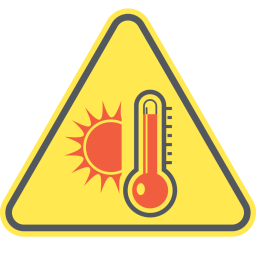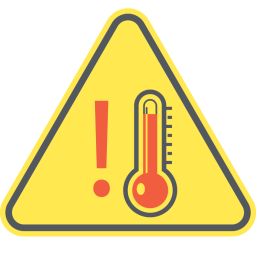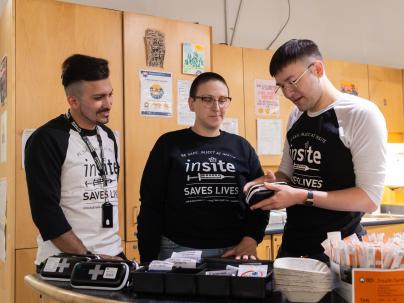Calor extremo
On this page
- Efectos del calor extremo sobre la salud
- Personas con mayor riesgo
- Efectos del calor extremo sobre la salud y formas de reducir el riesgo
- Medidas para protegerse y proteger a los demás contra el calor
- Cómo comunicarse con otras personas cuando hace calor y brindarles apoyo
- Centros de enfriamiento y espacios de enfriamiento
- “Advertencias de Calor” y “Emergencias por Calor Extremo”
- Consideraciones especiales para la salud mental y el consumo de sustancias
- Investigación y datos sobre el calor extremo
- Recursos para el calor extremo
- Recursos para profesionales médicos

Las altas temperaturas pueden poner en riesgo la vida, y el mayor peligro son las altas temperaturas en espacios cerrados durante episodios de calor extremo (“olas de calor”). Pero el impacto sobre la salud a causa del calor puede prevenirse. Conozca las señales de la enfermedad relacionada con el calor y las maneras de prepararse para el clima caluroso a fin de mantenerse a salvo y mantener a salvo a su familia, sus amigos y sus vecinos.
Relacionado: Cambio climático y la salud
Efectos del calor extremo sobre la salud
Los episodios de calor extremo, también conocidos como “olas de calor”, pueden causar diversas enfermedades relacionadas con el calor y aumentar el número de muertes. Enfermedad relacionada con el calor es un término amplio para las afecciones causadas por las altas temperaturas, como la erupción cutánea por el calor, las quemaduras solares, los calambres por el calor, la insolación y, la más grave, el golpe de calor.
Insolación
Los síntomas de la insolación incluyen:
- Sudoración intensa
- Erupción cutánea
- Mareos
- Náusea o vómito
- Respiración y frecuencia cardíaca aceleradas
- Dolor de cabeza
- Dificultad para concentrarse
- Calambres musculares
- Sed excesiva
- Orina oscura y disminución de la micción
Si una persona tiene síntomas, ayúdela a trasladarse a un lugar fresco, de ser posible. Dele agua, aflójele o quítele la ropa sobrante y enfríe su cuerpo con compresas de hielo, toallas mojadas o ropa húmeda. Continúe enfriándola y dándole agua hasta que la persona se sienta mejor. Si los síntomas empeoran o no mejoran, busque atención médica.
Golpe de calor
Los síntomas de golpe de calor incluyen:
- Temperatura corporal elevada (39 °C/102 °F o más)
- Desmayos o somnolencia
- Confusión
- Falta de coordinación
- Piel muy caliente y enrojecida (podría estar reseca)
El golpe de calor es una emergencia médica. Obtenga ayuda médica de inmediato en una sala de urgencias o en un centro de atención urgente. De ser necesario, llame al 9-1-1. Mientras espera a que llegue la ayuda, lleve a la persona a un lugar fresco, de ser posible. Enfríela rápidamente con compresas de hielo, toallas húmedas, un baño de esponja o una ducha, o bien, humedezca su ropa. Siga enfriándola y quédese con ella hasta que llegue la ayuda.
Si no está seguro o si tiene alguna pregunta que no sea de emergencia, llame al 8-1-1 para hablar con una enfermera.
Personas con mayor riesgo
Cada persona responde de manera diferente al calor, y algunas personas corren más riesgo de sufrir efectos sobre la salud. Es especialmente importante que los siguientes grupos de personas se mantengan frescos:
- Adultos mayores, de 60 años o más
- Personas que viven solas o que están aisladas desde el punto de vista social
- Personas con afecciones médicas preexistentes, como diabetes, cardiopatías o enfermedades respiratorias
- Personas con enfermedades mentales, como esquizofrenia, depresión o ansiedad
- Personas con trastornos por consumo de sustancias, incluido el alcohol
- Personas con movilidad limitada
- Personas cuya situación de vivienda es precaria
- Personas que trabajan o viven en ambientes calurosos
- Personas embarazadas
- Bebés y niños pequeños
El calor afecta a las personas de diferentes maneras, y es posible que algunas personas necesiten apoyo para mantenerse frescas. Cuando haga calor, preste atención a cómo se siente y asegúrese con regularidad de que las personas con mayor riesgo se encuentren bien. La mejor manera de prevenir las enfermedades relacionadas con el calor es pasar tiempo en lugares frescos y beber mucha agua.

PÓSTER
Efectos del calor extremo sobre la salud y formas de reducir el riesgo
Comparta los síntomas de las enfermedades relacionadas con el calor y las medidas para mantenerse a salvo durante las olas de calor. Traducciones disponibles.
Descargue el póster de calor extremo (en inglés)Medidas para protegerse y proteger a los demás contra el calor
El aspecto más peligroso de las olas de calor para la mayoría de las personas son las altas temperaturas en espacios cerrados. Pasar tiempo en un lugar fresco y beber mucha agua es la mejor manera de prevenir las enfermedades relacionadas con el calor.
El humo de los incendios forestales también puede causar problemas de salud. Tanto en los episodios de humo de incendios forestales, como en los de calor, considere también la posibilidad de filtrar el aire con purificadores de aire HEPA. Obtenga más información sobre el humo de incendios forestales.
-
Manténgase fresco y mantenga frescos a los demás
- Pase tiempo en espacios interiores y exteriores más frescos (es decir, un centro comunitario, una biblioteca o un centro comercial con aire acondicionado).
- Beba mucha agua y otros líquidos para mantenerse hidratado, aunque no tenga sed.
- Refrésquese con una ducha, un baño o sumergiendo parte de su cuerpo en agua.
- Use una camisa mojada o toallas húmedas para refrescarse.
- Use ropa holgada, transpirable y de colores claros.
- Limite sus actividades, especialmente durante las horas más calurosas del día (generalmente, de las 2 p. m. a las 4 p. m. en la Colombia Británica).
- Esté atento a las señales de insolación y golpe de calor. Para las personas vulnerables al calor, el riesgo de sufrir enfermedades relacionadas con el calor puede aumentar a temperaturas superiores a los 26 °C (78 °F) en espacios cerrados, y puede ser muy alto a temperaturas superiores a los 31 °C (88 °F) en espacios cerrados.
-
Mantenga los espacios frescos
- Durante el día, cierre las ventanas y las persianas para atrapar el aire fresco adentro y bloquear el sol.
- Por la noche, abra las ventanas y las puertas cuando esté más fresco afuera (generalmente, de 9 p. m. a 10 p. m. en la Colombia Británica). Algunos ventiladores de baño y cocina dan al exterior y se pueden usar para eliminar el aire caliente en espacios cerrados. Use ventiladores portátiles para jalar aire fresco hacia dentro de su hogar durante la noche.
- Considere la posibilidad de comprar un aire acondicionado para su hogar. Si tiene aire acondicionado, asegúrese de encenderlo.
- Vigile la temperatura en su espacio cerrado y en el de las personas de las que está al pendiente. Para las personas vulnerables al calor, el riesgo de enfermedades relacionadas con el calor puede aumentar a temperaturas superiores a los 26 °C (78 °F) en espacios cerrados.
“Advertencias de Calor” y “Emergencias por Calor Extremo”
En respuesta al domo de calor de la Colombia Británica en 2021, varios colaboradores del sector salud y el departamento de Medio Ambiente y Cambio Climático de Canadá (Environment and Climate Change Canada, ECCC) desarrollaron el Sistema de Alerta y Respuesta al Calor de la Colombia Británica (BC Heat Alert and Response System, BC HARS). Este sistema de alerta de dos niveles establece los criterios que utilizará el ECCC para declarar una Advertencia de Calor (nivel 1) o una Emergencia por Calor Extremo (nivel 2), los mensajes de salud pública apropiados para ambos tipos de alertas y las acciones recomendadas para el sector salud, los gobiernos locales y otros colaboradores.
Alertas
-

Advertencia de Calor (nivel 1)
Riesgo: las temperaturas diurnas y nocturnas son más altas que el promedio estacional y se mantienen estables.
Acción: tome las medidas habituales para mantenerse fresco y esté pendiente de las personas con mayor riesgo de verse afectadas por el calor. -

Emergencia por Calor Extremo (nivel 2)
Riesgo: las temperaturas diurnas y nocturnas son más altas que el promedio estacional y aumentan cada día más.
Acción: active su plan de emergencia y comuníquese al menos una vez al día con las personas con mayor riesgo de verse afectadas por el calor.
Recursos para el calor extremo
-
-
Alertas meteorológicas públicas para la Colombia Británica
Alertas meteorológicas del departamento de Medio Ambiente y Cambio Climático de Canadá (ECCC), que incluyen el calor y la calidad del aire.
-
Aplicación WeatherCan
Aplicación de alertas meteorológicas del departamento de Medio Ambiente y Cambio Climático de Canadá (ECCC) para teléfonos inteligentes con alertas de calor y calidad del aire.
-
Hello Weather
Servicio meteorológico telefónico automatizado del departamento de Medio Ambiente y Cambio Climático de Canadá (ECCC).
-
-
-
Póster de calor extremo (en inglés)
Autoridades sanitarias Vancouver Coastal Health y Fraser Health
-
Póster de calor extremo - traducido
Autoridades sanitarias Vancouver Coastal Health y Fraser Health; disponible en: inglés, árabe, chino simplificado, chino tradicional, hindi, coreano, farsi, punyabí, español, urdu, vietnamita y guyaratí
-
Verificaciones de salud durante episodios de calor extremo - traducido
Centro de Colaboración Nacional para la Salud Medioambiental; disponible en: inglés, francés, punyabí, chino simplificado, chino tradicional
-
Guía de preparación para el calor extremo - traducido
Prepared BC; disponible en: inglés, francés, punyabí, chino simplificado, chino tradicional
-
Preguntas frecuentes sobre los ventiladores en condiciones de calor extremo
Autoridades sanitarias Vancouver Coastal Health y Fraser Health
-
Cómo crear un kit para refrescarse - traducido
Autoridad sanitaria Vancouver Coastal Health y ciudad de Vancouver; disponible en: inglés, punyabí, chino simplificado, chino tradicional, tagalo, vietnamita.
-
Enfermedades relacionadas con el calor en bebés y niños pequeños - traducido
HealthLink BC; disponible en: inglés, árabe, chino simplificado, chino tradicional, farsi, francés, hindi, japonés, coreano, punyabí, ruso, español, tagalo, ucraniano, vietnamita
-
Preparados juntos para el calor extremo
Building Resilient Neighbourhoods y Hey Neighbor Collective; las conexiones entre vecinos pueden salvar vidas durante los episodios de calor. Vea consejos para conectarse, aprender y colaborar con los vecinos.
-
Cuidado de las unidades de aire acondicionado
Asociación de Administración de Viviendas Aborígenes; recomendaciones para el funcionamiento seguro y eficiente de las unidades portátiles de aire acondicionado.
-
-
-
Estrategia de apoyo a las organizaciones no gubernamentales para las comunicaciones a causa del calor
Autoridades sanitarias Vancouver Coastal Health y Fraser Health
-
Videos de capacitación para la comunicación a causa del calor
Autoridad sanitaria Vancouver Coastal Health
-
Comunicación a causa de calor: video de capacitación para formadores
Autoridad sanitaria Vancouver Coastal Health
-
Ejemplo de guión de comunicación a causa del calor
Autoridad sanitaria Vancouver Coastal Health
-
Diapositivas de capacitación sobre la comunicación a causa del calor
Autoridad sanitaria Vancouver Coastal Health
-
Capacitación para la comunicación a causa del calor: diapositivas para la capacitación de formadores
Autoridad sanitaria Vancouver Coastal Health
-
Situaciones de práctica para la comunicación a causa del calor
Autoridad sanitaria Vancouver Coastal Health
-
Situaciones de práctica para la comunicación a causa del calor: guía de facilitación
Autoridad sanitaria Vancouver Coastal Health
-
Llamadas de verificación en condiciones meteorológicas extremas para personas mayores políglotas
MOSAIC. Disponible en varios idiomas
-
Creación de espacios de enfriamiento durante climas calurosos: guía para organizaciones comunitarias
Autoridad sanitaria Vancouver Coastal Health
-
Sistema de apoyo de emergencia para personas mayores
Renfrew Collingwood Senior’s Society
-
Información sobre el estrés térmico para los trabajadores
WorkSafe BC
-
Ejemplo de plan para el calor y el humo de incendios forestales para los gobiernos locales
Autoridad sanitaria Vancouver Coastal Health
-
Planificación de la respuesta al calor para las comunidades del interior sur de la Colombia Británica: herramientas
Autoridad sanitaria Interior Health: sepa lo que su comunidad puede hacer para prepararse para el calor.
-
Guía para las reuniones al aire libre
Autoridad sanitaria Vancouver Coastal Health
-
-
-
Cómo ser un líder empresarial consciente del calor
Autoridad sanitaria Fraser Health
-
Información sobre el estrés térmico para los trabajadores
WorkSafe BC
-
Guía para el calor para escuelas y guarderías
Autoridades sanitarias Vancouver Coastal Health y Fraser Health
-
Instalaciones de atención comunitaria y el calor
Autoridad sanitaria Vancouver Coastal Health
-
Guía de recursos: planificación para el calor
VCH y Health Emergency Management BC; cómo pueden los centros de atención comunitaria comenzar a planificar para la temporada de calor y qué mes se recomienda para cada paso.
-
Plantilla de plan de respuesta al calor
VCH y Health Emergency Management BC; plantilla rellenable del plan de respuesta al calor para centros de atención comunitaria.
-
Lista de verificación para la evaluación del sitio
VCH y Health Emergency Management BC; listas detalladas de verificación clínica y específica de cada sitio para ayudar a los centros de atención comunitaria a planificar para el calor.
-
Guía de identificación de riesgos para residentes
VCH y Health Emergency Management BC; criterios para identificar a los residentes de los centros de atención comunitaria con mayor riesgo de sufrir de enfermedades relacionadas con el calor.
-
Listas de verificación para preparar la respuesta al calor
VCH y Health Emergency Management BC; lista breve de verificación que los centros de atención comunitaria pueden llenar antes de cada temporada de calor.
-
Registro de temperaturas para la respuesta al calor
Vancouver Coastal Health y Health Emergency Management BC; plantilla de registro de la temperatura en espacios cerrados para centros de atención comunitaria.
-
Lista de verificación para la respuesta al calor
Vancouver Coastal Health y Health Emergency Management BC; verificación diaria de preparación para los centros de atención comunitaria durante las alertas de calor.
-
Enfermedades relacionadas con el calor: prevención y gestión en centros de atención comunitaria
Autoridades sanitarias Vancouver Coastal Health y Providence Health Care
-
Guía sobre temperaturas extremas para restaurantes
Autoridad sanitaria Vancouver Coastal Health
-
Los operadores de piscinas se enfrentan al calor extremo y al humo de los incendios forestales
Autoridad sanitaria Fraser Health
-
-
-
Calor del verano, humo de incendios forestales y la salud: acciones recomendadas para propietarios y administradores de viviendas de alquiler y en régimen de propiedad horizontal
Autoridades sanitarias Vancouver Coastal Health y Fraser Health
-
Recursos para preparar edificios e instalaciones para el calor extremo
BC Housing
-
Tarjeta de verificación de bienestar para inquilinos durante temporada de calor
BC Housing
-
Creación de espacios de enfriamiento durante climas calurosos: guía para organizaciones comunitarias
Autoridad sanitaria Vancouver Coastal Health
-
Evaluación de organizaciones respecto del plan de respuesta al calor extremo y al humo de los incendios forestales: lista de verificación para operadores de edificios
BC Housing
-
Recursos para profesionales médicos
-
-
Atención comunitaria durante el calor extremo
Health Canada
-
Atención aguda durante el calor extremo
Health Canada
-
Plan de acción contra el humo de incendios forestales y el calor extremo (con instrucciones del proveedor)
Legacy for Airway Health, Universidad de la Colombia Británica (University of British Columbia, UBC) Instituto de Investigación de VCH
-
Preparación de los centros de salud para el calor extremo
Health Canada
-
Guía técnica para trabajadores de atención médica
Health Canada
-
Para farmacéuticos (incluidos los factores de riesgo de los medicamentos)
Health Canada
-
Preguntas frecuentes sobre el calor extremo y el humo de los incendios forestales
Autoridad sanitaria Vancouver Coastal Health
-
Recurso para el personal sobre el calor extremo y el humo de los incendios forestales
Autoridad sanitaria Vancouver Coastal Health
-
















